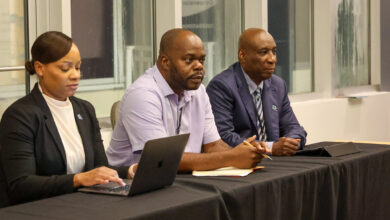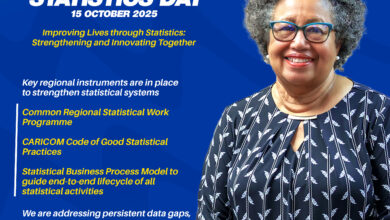The Honourable Baldwin Spencer, Prime Minister of Antigua and Barbuda Chairman, the Honourable Harold Lovell, Minister of Finance, of Antigua and Barbuda and other Ministers of Government Ambassador Valeriano Diaz, Head of the Delegation of the European Union to Barbados and the Eastern Caribbean Governor of the Eastern Caribbean Central Bank Sir K Dwight Venner Representatives of International and Regional Organisations Representatives of CARIFORUM Member States and Associate Members Representatives of the Private Sector Assistant Secretary General Irwin La Rocque and staff of the CARICOM Secretariat including the CARIFORUM Directorate Representatives of the Media Distinguished Ladies and Gentlemen
As Secretary-General of CARIFORUM, the Caribbean Forum of African Caribbean Pacific (ACP) States, it is with pleasure – and not a little exhaustion – that I address you this morning. This meeting comes less than two days after the 31st Meeting of the Conference of Heads of Government of the Caribbean Community held in Montego Bay, Jamaica, which as you would expect required significant mental and physical energy.
However, my presence here today is testimony to my appreciation of the importance of Financial Services and indeed, of the entire services sector to the Caribbean. The services sector accounts for more than 70 percent of the gross domestic product of most countries of the Region.
I therefore wish to take this opportunity to thank the Commission of the European Union for co-sponsoring this conference with the CARIFORUM countries. I must also express the Region’s appreciation to the Honourable Baldwin Spencer, Prime Minister of Antigua and Barbuda, Lead Head of Government with responsibility for Services in the Quasi-Cabinet of CARICOM Heads of Government, for initiating the actions which have led to the holding of this very important Joint CARIFORUM/EU Conference.
I also wish to thank the many international and regional agencies, for agreeing to participate in what I feel confident will be a successful conference.
Mr Chairman, this conference comes at a most opportune time for the Caribbean Region. It will allow the Region to review the current status of its Financial Services Sector, describe the challenges faced and assess the demands which will be made on the regulatory environment in the Region. The conference will also afford the chance to explore how the Caribbean can convert the existing challenges into opportunities, not least in the continuing efforts at economic diversification in the Region.
It was with that diversification in mind that, in the 1980s, International Financial Institutions (IFIs) encouraged countries in the Caribbean to promote international financial services as a mechanism for economic diversification, income and employment generation and growth. A number of our Caribbean countries has become successful in implementing that policy initiative
However, over the last ten or so years, the very success deriving from the pursuit of that policy prescription has attracted negative attention of certain institutions including the Organisation of Economic Cooperation and Development (OECD). In this case success seems to have attracted more punishment than reward.
There seems to exist the perception that successful international financial centres are havens for tax evasion and tax avoidance. Following the OECD 1998 Report on “Harmful Tax Competition: An Emerging Global Issue” which described the identifying and contributory characteristics of what was termed ‘tax havens’, Caribbean countries have had to subscribe to the OECD Model Tax Convention. In so doing they had to make amendments to their legislation and practices relating to international financial and banking activities and strengthen their network of double taxation treaties. This was all in an attempt to remove themselves from a blacklist, compiled by the OECD, which sought to name, shame and punish those countries that did not comply with the requirements of the OECD.
But that was not all. The goal posts were shifted from time to time. Apart from ‘committing’ to the OECD imposed tax standard, Caribbean jurisdictions were required to show a certain degree of compliance by signing at least twelve (12) Tax Information Exchange Agreements (TIEAs) with major capital suppliers – all of this at the height of the global financial and economic crisis. By July 2010, the vast majority of the CARIFORUM international financial jurisdictions were able to do so.
Mr Chairman, the Caribbean has therefore been engaged in a continuous struggle to secure a level playing field in developments related to international financial services. The Caribbean Association of Regulators of International Business, followed by the International Tax and Investment Organisation, with headquarters in Barbados, was at the forefront of that effort.
Despite those attempts, Caribbean jurisdictions are still treated less favourably than, for example, certain European jurisdictions for identical circumstances.
The OECD countries continue to put pressure on corporations in their jurisdictions with subsidiaries in International Financial Centres. In this regard, Caribbean jurisdictions will find themselves coming under increasing scrutiny.
All of these developments continue to have negative implications for the Caribbean. Entities which might have been licensed, incorporated or registered in the Caribbean are taking their business elsewhere. Some others already located in the Caribbean are departing. The in-depth and comprehensive monitoring and peer review, decided by the September 2009 Global Forum Meeting in Mexico, will create further problems for Caribbean jurisdictions. Unless that negative trend can be reversed, Caribbean economies will face tougher challenges to maintain jobs, earn income and generate foreign exchange from the sector.
From a regional perspective, joint actions and strategies and the operation of joint and common institutions provide the most effective means of developing and strengthening the Region’s financial services sector. Such action also constitute the most viable mechanism for dealing with some of these global developments, including the negative perceptions which some may have of the industry in the Caribbean. These institutions include the following:
(i) The Caribbean Association of Insurance Regulators (ii) The Caribbean Group of Bank Supervisors (iii) The Caribbean Group of Securities Regulators; and (iv) The CARICOM Committee of Central Bank Governors.
These together with a ‘Caribbean College of Regulators’ would go a long way in addressing the credibility of the regulatory environment in the Caribbean for Financial Services.
As part of our commitment to deepen regional integration in the financial services sector, the Caribbean Community has a Financial Services Agreement under consideration. That Agreement is intended to give effect to the provisions of Chapter Three of the Revised Treaty of Chaguaramas. It would create a single financial space with common legislation, regulations, administrative procedures and practices. It provides for cross border supervision and harmonisation of standards.
Against this background of the Caribbean’s commitment and its actions to set high standards in the financial services sector, it is heartening to see representatives from so many regional and international agencies and organisations coming together over the next two days to assist in this process. I especially want to thank the European Union for its financial and technical contribution to this Forum. I must also thank the World Bank, the International Monetary Fund, the Inter-American Development Bank as well as the OECD, Caribbean Central Bankers – including the ECCB -, the Caribbean Development Bank, the University of the West Indies, CARTAC and the Financial Action Task Force for their willingness to share their expertise over the next two days.
It is with that sense of knowledge sharing, that I want to wish this conference every success as we seek to ensure that this Region has the opportunity to give its citizens a more than equal chance to build a viable and prosperous society.
I thank you for the opportunity to make these hopefully relevant remarks at the opening of this timely important conference.





